Describe the Jurisdiction of the Juvenile Court
These definitions are based primarily on age criteria. Juvenile court judges understandably have taken different sides of this debate186 The juvenile court also has the responsibility of setting the standards by which the juvenile system will be governed.

Pdf What Is A Juvenile A Cross National Comparison Of Youth Justice Systems
They have staff that keeps.
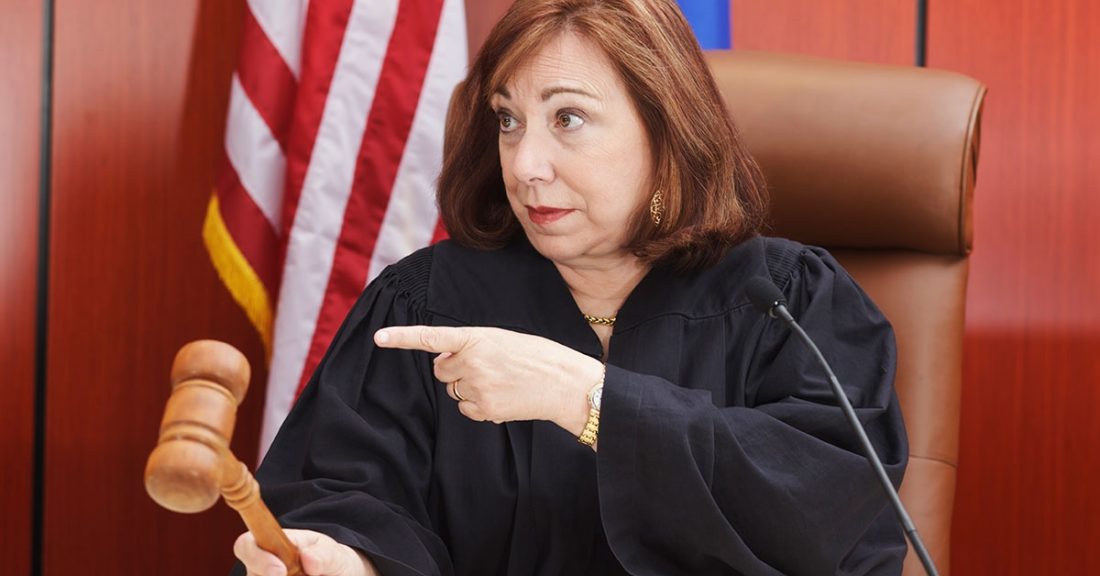
. Residents are restrained with handcuffs in this facility. A juvenile is defined as someone who is between the ages of 12 and 18. The normal age of these defendants is under 18 but juvenile court does not have jurisdiction in cases in which minors are charged as adults.
This facility had the authority to place children in private industry through indenture work agreements to help them build employable skills. These buildings are locked and often fenced. Juvenile court has jurisdiction over acts of delinquency any act committed by juvenile that would be a crime if committed by a adult.
JUVENILE COURT JURISDICTION tions of juvenile court jurisdiction will be refined later. To access forms to file a claim and for additional information on. State statutes define which youth are under the original jurisdiction of the juvenile court.
Includes status offenses not considered crime if committed by an adult. Essentially there are two types of. Describe the jurisdiction of the juvenile court.
In addition delinquency typically includes status offenses. The juvenile court has jurisdiction over acts of delinquency which describes any behavior a juvenile commits that would be a crime if committed by an adult. THE JUVENILE COURT AND ITS JURISDICTION Todays juvenile delinquency cases are sometimes handled as part of a criminal trial court jurisdiction or even within the probate court.
Termination of parental rights proceedings. Each state defines the age range of the term juvenile. Anyone older than the juvenile age will go.
In most States the juvenile court has original jurisdiction over all youth charged with a criminal law violation who were below the age of 18 at the time of the offense arrest or referral to court. Easy Access to Juvenile Court Statistics. Shufelt Cocozza 2006.
A status offense is any act committed by a juvenile by an adult. In this way the court provides leadership both to the community and to all participants in the juvenile court system187. The juvenile court ie a judge master or appointed designee must ensure that all processes and decisionmaking are carried out in a fair and unbiased manner that all decisions balance the best interests of the juvenile with the best interests of the victim and community and that the constitutional rights of all parties are upheld.
Once in court the juvenile case is adjudicated and a disposition is handed down. Age Eligibility for Juvenile Court. These buildings may have adult inmates depending on your states laws.
For present purposes they serve to establish the point that the typical juvenile court has a jurisdictional base that extends beyond the violator of the criminal law and embraces actions and family circumstance deemed presently or poten-. The court does not have any jurisdiction over individual state employees. This is for short-term use before court hearings or transport to other facilities.
State juvenile courts with delinquency jurisdiction handle cases in which juveniles are accused of acts that would be crimes if adults committed them. The procedure in juvenile court is not always adversarial although the. To be eligible for juvenile court a young person must be considered a juvenile under state law.
Results from a multi-state prevalence study. Delinquency Children requiring assistance CRA Care and protection Adult contributing to the delinquency of a minor Adoption Guardianship Youthful offender and. The juvenile court has jurisdiction over acts of delinquency which describes any behavior a juvenile commit that would be a crime if committed by an adult.
Youth with mental health disorders in the juvenile justice system. Although courts with juvenile jurisdiction handle a variety of cases including abuse neglect adoption and traffic violations the Juvenile Court Statistics series focuses on the disposition of delinquency cases and formally pro- cessed status offense cases. What are three types of cases heard in juvenile court.
Criminal proceedings in the Juvenile Court are referred to as delinquency matters. Also called surrogate court in some states probate court is a court of special jurisdiction that handles wills admin-. Judges in the Court of Claims are appointed by the governor for terms of 9 years.
In 47 states the maximum age of juvenile court jurisdiction is age 17. 2 Over two-thirds of youth involved with the juvenile justice system experience mental. When a child between these ages is alleged to have committed a crime the case is prosecuted in the Juvenile Court in the geographic area where the crime was committed.
Juvenile court has the exclusive jurisdiction to do so if the parents are unmarried as provided under RC. The Juvenile Court Department has general jurisdiction over the following case types. The Court of Claims is a state-wide court having exclusive jurisdiction over claims for monetary damages against the State.
In most states the individual must be 17 or younger to fall under the jurisdiction of the juvenile court. Some states also have a legal provision which allows the prosecutor to file a juvenile case in both juvenile and adult court because the offense and the age of the accused meet certain criteria. Most states give their juvenile courts legal jurisdiction over cases involving delinquency abuse and neglect and status offense proceedings.
What is the youngest age that a juvenile can be transferred to criminal court for trial as an adult. Juvenile detention center. A special court or department of a trial court which deals with under-age defendants charged with crimes or who are neglected or out of the control of their parents.
Prosecutorial transfer does not have to meet the due process requirement stipulated by Kent v. In addition delinquency typically includes status offenses. In 1824 the New York House of Refuge became the foundation for the beginnings of the juvenile justice system.
Describe the development and jurisdiction of the juvenile justice system. In 2020 Vermont became the first state in the nation to expand juvenile court jurisdiction to 18. This petition outlines the jurisdiction authority of the juvenile court over the offense and detained individuals gives notice for the reason for the court appearance and serves as notice to the minors family.
Records from juvenile courts are sealed documents unlike.
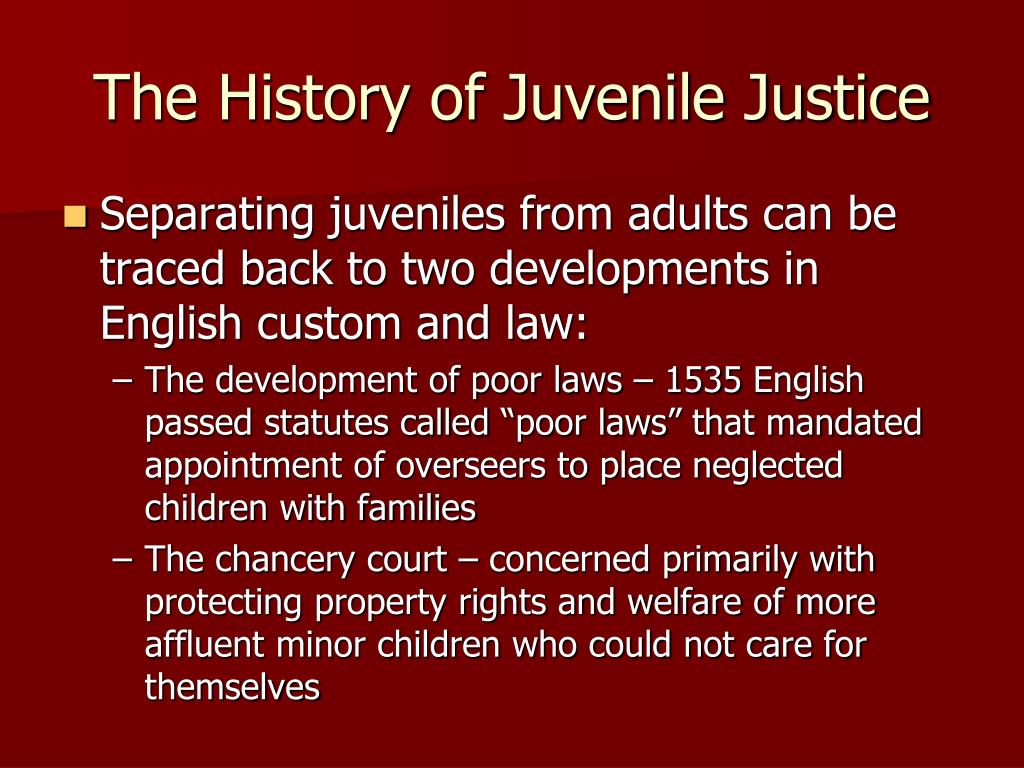
Ppt Chapter 15 The Juvenile Justice System Powerpoint Presentation Free Download Id 2412413

Chapter 5 The Juvenile Court Ppt Download

7y Thursday Mn Juvenile Justice System Ppt Download

Ppt Chapter 15 The Juvenile Justice System Powerpoint Presentation Free Download Id 2412413

Juvenile Justice System Ppt Download

What Is Juvenile Justice The Annie E Casey Foundation
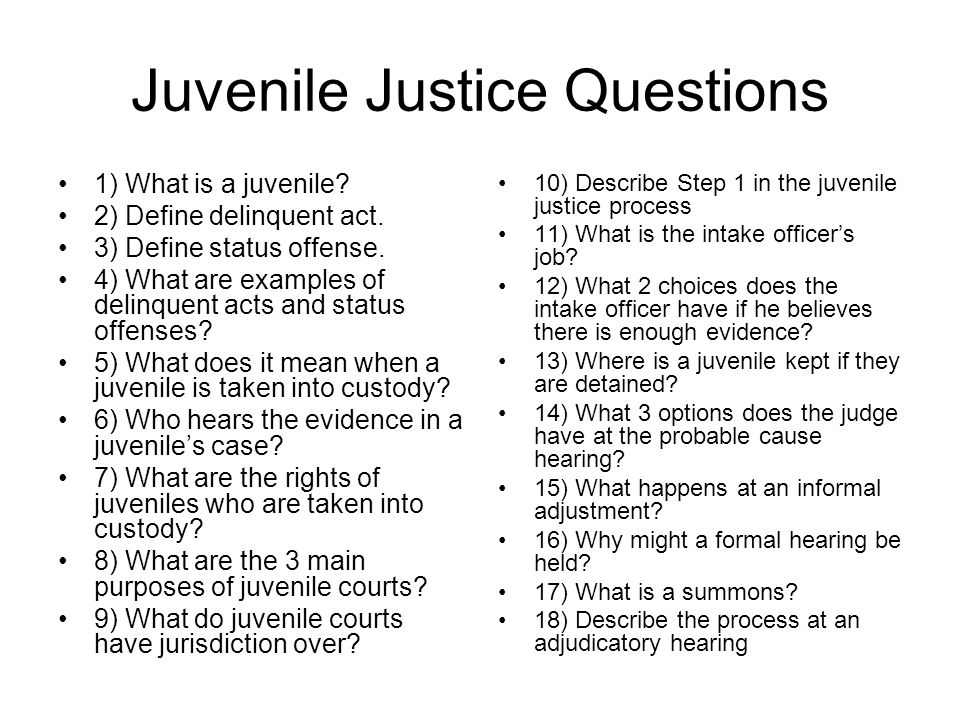
The Juvenile Justice System Ppt Video Online Download
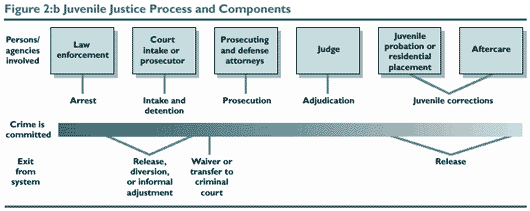
Chapter 2 Jurisdictional And Program Self Assessment The Components And Processes Of The Juvenile Justice System Jurisdictional Technical Assistance Package For Juvenile Corrections
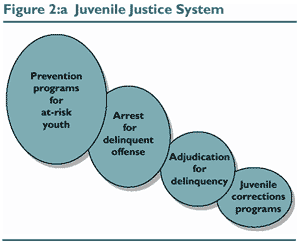
Chapter 2 Jurisdictional And Program Self Assessment The Components And Processes Of The Juvenile Justice System Jurisdictional Technical Assistance Package For Juvenile Corrections

Frequently Asked Juvenile Justice Questions Part Of The System Org

Pdf Juvenile In Justice Children In Conflict With The Law In Indonesia

Pdf The True Juvenile Offender Age Effects And Juvenile Court Sanctioning

7y Thursday Mn Juvenile Justice System Ppt Download

Parental Rights In Case Law Kidjacked Child Protective Services Parenting Child Custody
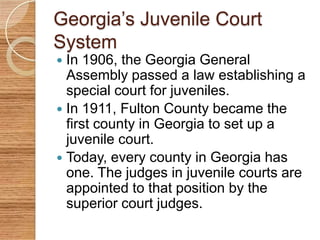
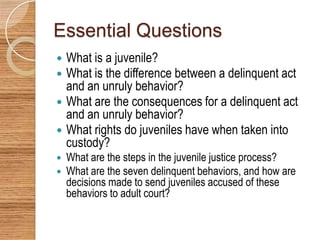
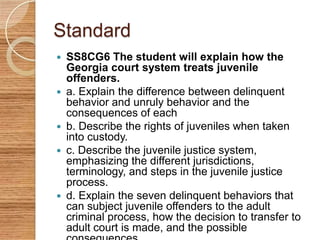
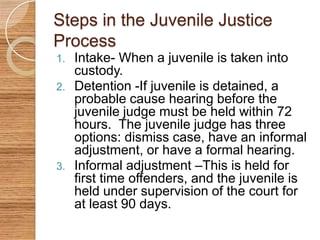
Comments
Post a Comment